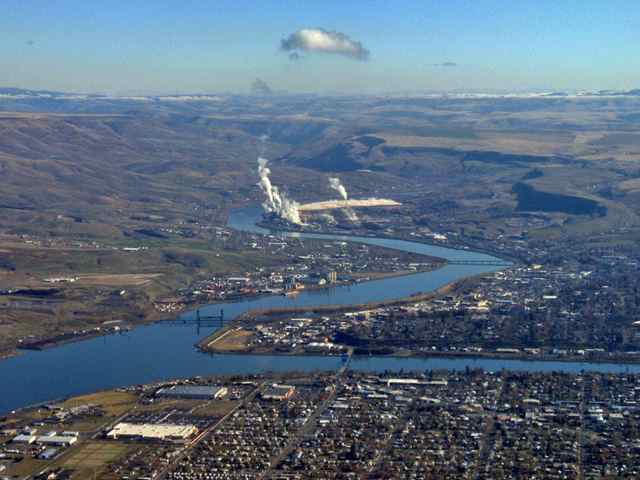forum
library
tutorial
contact

Barges Running Aground at Lewiston
as Dredging Controversy Drags On
by Tom Banse
NW News Network, November 25, 2014
|
the film forum library tutorial contact |

|
Barges Running Aground at Lewiston
by Tom Banse
|
 Lewiston, Idaho has had unusual bragging rights for the past 40 years. It's the farthest inland seaport on the West Coast -- 465 miles upriver from the Pacific Ocean.
Lewiston, Idaho has had unusual bragging rights for the past 40 years. It's the farthest inland seaport on the West Coast -- 465 miles upriver from the Pacific Ocean.
The viability of the port of Lewiston depends on regular dredging of the Snake River. But on Monday, environmental and fishing groups and the Nez Perce Tribe went to federal court to stop plans to dredge starting next month.
The U.S. Army Corps of Engineers along with port officials in Lewiston and Clarkston describe dredging as an urgent need. Critics call it a "boondoggle" and a setback to salmon and lamprey recovery.
Dredging vs dam removal
Lewiston port manager David Doeringsfeld said it has been nearly nine years since the last dredging of the port berths and nearby navigation channel.
"At this point, we are definitely overdue," he said. "The need is critical at this point. The sedimentation is causing impacts and safety concerns. We need to dredge."
Doeringsfeld said just about anywhere else this modest maintenance project would not be news. But Idaho's only seaport is not just any old place. It's upriver of four Snake River dams long in the crosshairs of some environmental groups.
Environmentalists wrote to the Army Corps this fall that the best way to deal with sediment buildup around Lewiston and Clarkston would be to breach the downstream dams.
"If we do have a sediment problem at this confluence, one way that the Corps did not study to move that sediment downstream would be to remove the impoundment downstream," said Dustin Aherin. He owns Idaho River Adventures, a whitewater rafting outfitter and guide company.
Aherin is allied with environmental groups. But Aherin prefers to make a business case against dredging here. He argues the multi-million dollar costs for dredging, lock maintenance and government studies far outweigh the community benefits.
"So we as the taxpayers, not only in the local Nez Perce County, Idaho/Asotin County, Washington area, but also folks in Seattle, Olympia, Portland, California -- everywhere across the United States -- end up chipping in to support this real small portion of our waterborne shipping," Aherin said.
The conservation camp and port business interests have each enlisted economists to bolster or debunk the subsidy argument.
Grounding barges
Meanwhile out on the river, it's getting harder to carry on business as usual.
While Aherin and I spoke on the Lewiston levee, a pair of transport barges took on wheat at a big grain elevator on the opposite shore. Arvid Lyons manages that operation, the Lewis-Clark Terminal.
"We stuck several barges at the berth here," he said. "We've grounded a barge out in the turning basin at 13'4" (depth). There's been a barge that grounded over at Clarkston on the edge of the channel at 13'4". And we've grounded barges over at the berth at Clarkston at ten feet."
Grain moving downstream for export accounts for the great majority of commercial traffic on the lower Snake River. Environmental groups suggest this grain could go to market by rail instead. But Lyons said competition for space on the rails from rising oil train traffic presents a new argument for keeping the barge terminals viable.
"The rail system is congested," he said. "We're seeing more bushels. We've had record years in the last couple years, some of our best years ever."
Besides cargo barges, the Lewiston-Clarkston Valley is also a destination for river cruise lines. The manager of the Port of Clarkston says further silt accumulation could put regular visits by three cruise ships "in jeopardy" in 2015.
Now it falls to a federal judge to make a quick decision on the balancing of harms and the likelihood the critics will prevail at trial.
Typically, the court imposes a preliminary injunction if the plaintiffs can show one of their interests may suffer "irreparable" harm were the challenged action to proceed.
"On the environmental side, the courts have been pretty clear that environmental harms are irreparable," said Earthjustice attorney Steve Mashuda, who is working on the Snake River dredging case.
A temporary injunction would likely delay any dredging by at least a year because the allowed in-water work window in winter is short.
Related Pages:
Snake River Dredging Goes Back to Court as Barge Traffic Drops by Rocky Barker, Idaho Statesman, 11/25/14
Snake River Dredging Challenged by Fishing Groups by Rich Landers, Spokesman-Review, 11/25/14
Lawsuit Filed to Stop Snake River Dredging by Nicholas Geranios, The Columbian, 11/25/14
learn more on topics covered in the film
see the video
read the script
learn the songs
discussion forum
